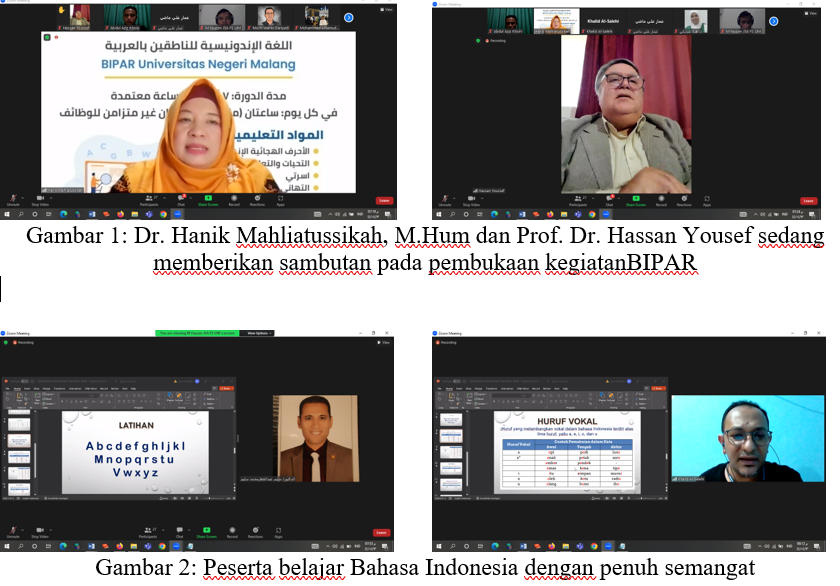
UM’S ARABIC LANGUAGE EDUCATION SUCCESSFULLY HELD NATIONAL ARABIC LANGUAGE TRAINING
The Arabic Language Education Study Program, State University of Malang (UM) successfully held a National Training on Arabic Language Learning Innovations for Children: Learning By Doing for two days, July 23-24, 2022. This learning was attended by elementary school Arabic teachers from 110 cities and districts in Indonesia. From the island of Java to outside Java. There were even participants from abroad, namely from Egypt and Oman. The speaker presented in the activity was Dr. Hanik Mahliatussikah, M.Hum, Head of the Arabic Literature Department, as well as the chief executive of the action. She delivered material on Arabic language learning techniques (BAR) through play. The Department of Arabic Literature has 2 study programs, namely the Bachelor of Arabic Language Education study program with Superior Accreditation, with the highest SINTA ranking (1st best) of 201 PBA study programs in Indonesia. Second, the Master of Arabic Language Teaching Study Program with accreditation.
The second speaker was Dra. Nur Anisah Ridwan, M.Pd., a lecturer in the Arabic Language Education Study Program (PBA) UM. He delivered material on BAR learning techniques through singing. The third speaker, Alfisyah, S.Pd, an Arabic teacher at the Indonesian School in Jeddah, Saudi Arabia, delivered material about Learning by doing-based learning at the Indonesian School in Jeddah. The fourth speaker, Dr. Ibnu Samsul Huda, SS, MA, a lecturer at the PBA UM study program, delivered material about storytelling in Arabic language learning for children, and finally, Ade Rahmat, SPd as the chairman of the Indonesian Arabic MGMP Forum from MAN Binjai North Sumatra, delivered material about the urgency, dynamics, and existence of Arabic language learning in Indonesia.
Meanwhile, the Chairperson of the UM Arabic Literature Department, Dr. Hanik Mahliatussikah, M.Hum., in her remarks, said that this activity was a Department service program for Arabic teachers in elementary schools. So that teachers of other subjects do not leave behind Arabic teachers. This activity is also to generate enthusiasm and strengthen and network the teachers. “Teachers can exchange experiences and information and learn from each other related to the application of learning techniques and the application of Arabic learning media for children, both digital and conventional,” he said.
With this activity, the participants can express their opinions verbally and exchange knowledge and experience. In addition, it is also a place to identify problems experienced among Arabic teachers and find solutions to them. “The trainees, in addition to getting material from the speakers, were also asked to make one design of teaching techniques with a choice of themes given and were given the task of compiling Arabic teaching steps with the chosen technique,” explained Hanik. Doing the tasks by the trainees is a mandatory requirement for participants to get a certificate. In addition to being a gathering place between Arabic language teachers throughout cities in Indonesia, this activity can also improve the ability of Arabic language teachers according to their fields. Especially Arabic teachers at the elementary school level (PAUD, SD / SDI, MI / MIN).
Picture 1. Participants learn Indonesian with enthusiasm.
Enthusiastic participants in the National Training on Arabic Language Learning Innovations.